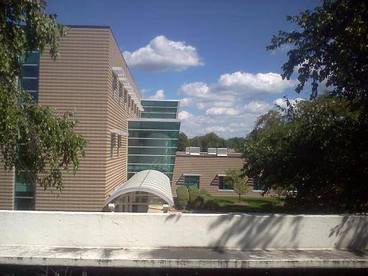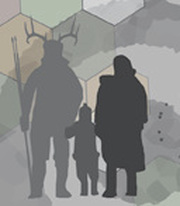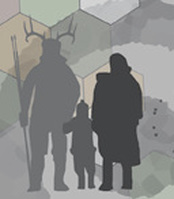
The photo at the right is the view out of my office window. It is pleasant now, and the sun streams in in the morning. One student assures me, however, that winter in Allendale is "like hell without the fire." Reportedly the snow may pile up high enough that I'll need a chair to see over it.
I am really enjoying teaching. A third of the way through the semester, I'm finding it both challenging and rewarding. I've gotten a lot of offers of help (in terms of course materials, lectures, etc.) from people both inside and outside and outside my department. While it is great to have that material there to tap into, I'm finding that (like many other things in my professional life) it works best for me to do it my way: if the organization and presentation doesn't make sense to me, it is much more difficult for me to communicate the materials, concepts, and ideas effectively in the style I want to. So I'm prepping everything more-or-less from scratch and it's not leaving a lot of time for anything else at this point. I feel very supported by the other faculty in the department: they've all been where I'm at now and they understand why I'm usually in a hurry or barricaded in my office.
All this class prep has taken a toll on my research agenda. That's the short term downside of this job: my scholarship has come to a grinding halt. I have research in various stages sitting dormant and looming manuscript commitments that are going to be a real struggle to meet. I have turned down invitations to participate in sessions at regional and national meetings. I gave up the idea of trying to put together a session for this year's SAAs. I haven't been able to keep up with even the small number of emails and phone calls I get from other scholars who are interested in my work. The Eastern Woodlands Household Archeology Data Project website sits untouched. Big parts of this website remain unfinished.
But teaching these courses and investing in making them "mine" will have some benefits over the longer term that will far outweigh the short term professional costs of slowing my publishing and letting some other professional activities languish.
First, I will never again have to duplicate the amount of effort I am currently putting into prepping these courses: next semester (or any other time I teach these courses or similar ones), much of the work will be done (in complex systems language, I will be doing more refining than innovating). The second time I teach these courses they will be much simpler to prep and, hopefully, easier to teach well.
Second, I have no doubt that teaching these courses will have huge positive impact on my research over the longer term. This semester I'm teaching Human Origins, Origins of Civilization, and Introduction to Archaeology. That makes me responsible for communicating in non-specialist terms the entire prehistory of humanity, from hominid origins to empires, as well as our methods for addressing anthropological questions using material remains. Because of the students I have (mostly non-majors), I spent some time at the beginning of each course talking about what anthropology and archaeology are and, in some cases, giving broad overviews of world prehistory and the history of archaeology and anthropology as disciplines. A third of the way into the semester, however, the overlap between the courses has largely vanished: last week I covered (among other things) lithics, genetics, domestication, and the structure and operation of redistributive economies; in the coming week I'll be covering ceramics, primate anatomy and cladistics, and the formation of early states in Mesopotamia. There are a lot of different things to cover each week, and I'm having to do a lot of "re-learning" as well as careful thinking about how best to teach the assortment of topics that is on my plate for the week. (As a side note, this experience has made me really appreciate the breadth and depth of the graduate education I got at Michigan - almost nothing that I am teaching is unfamiliar to me. I owe a great deal to the outstanding professors I had there.)
What does this have to do with scholarship? A lot. This teaching experience is giving me the opportunity, for the first time since my prelim exams, to have all of this different information in my head at the same time. It is a reboot that is refreshing my appreciation and knowledge of the vast scope of our discipline and the profound questions that we are trying to address. It is strengthening my understanding of how my own research and approach to anthropological archaeology can articulate with the big questions of four-field anthropology, questions that have been around since Boas and continue to be fundamental today. This semester is reminding me in some ways of my first year as a doctoral student at Michigan: the combination of courses I was taking was very challenging but overlapped in so many interesting ways that barely a day would go by without having a light bulb go off in my head somewhere. The same thing is happening now. I won't be writing any term papers this semester (or much of anything other than lectures, assignments, and exams), but I'll have plenty of gas receipts hurriedly tagged with insights that have crystallized during my commutes between Ann Arbor and Allendale (the only processing time that my brain really gets these days).
When I have the opportunity to ramp up my research again, it will be with a renewed energy and an improved capacity to connect my work to what remain the fundamental questions of our discipline. I cannot wait to put energy into exploring and developing some of the ideas that are accumulating in my pile of gas receipts. That's the long game of this teaching job: there is no question it is going to turn me into a better teacher, a better scholar, and a better four-field anthropologist. The long game is a sure thing - you can bet on it. My more immediate goal is to knock these classes out of the park. I'm pretty confident in the outcome of that short game, also, and I'm really glad that the others in my department at GVSU put their money on me.


 RSS Feed
RSS Feed
